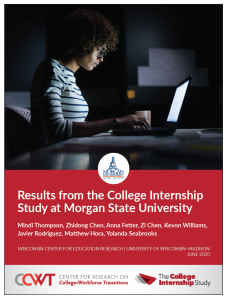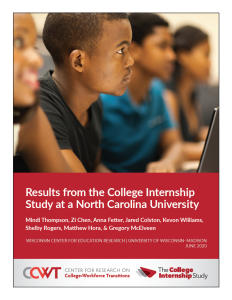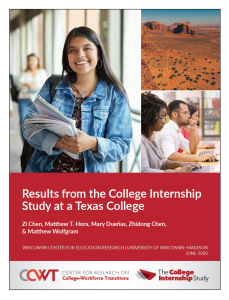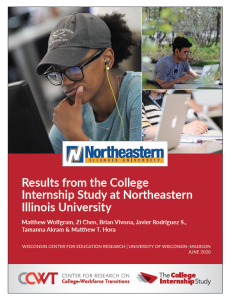Filter by Category:
Search
Year
- Category: Research Reports
- Clear Filters
 Thompson, M., Chen, Z., Fetter, A., Chen, Z., Williams, K., Rodriguez, J., Hora, M.T., & Seabrooks, Y. (2020). Results from the College Internship Study at Morgan State University. Center for Research on College-Workforce Transitions.
Thompson, M., Chen, Z., Fetter, A., Chen, Z., Williams, K., Rodriguez, J., Hora, M.T., & Seabrooks, Y. (2020). Results from the College Internship Study at Morgan State University. Center for Research on College-Workforce Transitions.
Summary: This report includes findings from the first round of data collection at Morgan State University (MSU) for The College Internship Study, which is a national mixed-methods longitudinal study of internship programs conducted by the Center for Research on College-Workforce Transitions.
(CCWT) at the University of Wisconsin-Madison (UW-Madison). The findings are based on
an interdisciplinary sample of students who took an online survey (n = 308), individual phone interviews with students who have and who have not had an internship experience (n = 41), individual phone interviews with career specialists, faculty, and program directors (n = 7), and individual phone interviews with employers (n = 5).
We would like to thank MSU for their partnership with our research team and for allowing us to speak with your students, educators, and community members. We hope that our findings are useful as you work toward improving internships and work-based learning for your students. Four research questions guide our study: (1) How many students are participating in internship programs, and does participation vary by student demographics, academic status, or life/employment situation? (2) What barriers exist for students to participate in internship programs? (3) What is the structure and format of internship programs? And, (4) How, if at all, is program structure and format associated with student satisfaction with their internships and their estimation of the value of the internship for their career development? In addition, given the timing of our interviews (Spring 2020), we also were interested in understanding MSU students’ experiences related to the COVID-19 pandemic. As our research moves into its second year, we will focus on the impacts of the COVID-19 pandemic on the students, faculty and staff at MSU and employer partners with respect to internships and its impacts on their studies and career goals.
 Thompson, M., Chen, Z., Fetter, A., Colston, J., Williams, K., Rogers, S., Hora, M.T., & McElveen, G. (2020). Results from the College Internship Study at a North Carolina University. Center for Research on College-Workforce Transitions. UW-Madison.
Thompson, M., Chen, Z., Fetter, A., Colston, J., Williams, K., Rogers, S., Hora, M.T., & McElveen, G. (2020). Results from the College Internship Study at a North Carolina University. Center for Research on College-Workforce Transitions. UW-Madison.
Abstract: This report includes preliminary findings from the first round of data collection for The College Internship Study, which is a mixed-methods longitudinal study of internship programs at a North Carolina University
The study includes an online survey of students in the second half of their academic programs (n=276), focus groups with students who have and who have not had an internship experience (n=20), and interviews with career coaches and faculty (n=5). The research questions guiding this study focus on how stakeholders conceptualize and define the idea of internships, institutional capacity for administering internship programs, participation rates by certain student characteristics, and the relationship between internship program structure and student outcomes.
This report concludes with recommendations for specific steps that students, faculty and staff at the North Carolina University, and employers who supervise interns can take to increase participation rates, access, and program quality for internship programs.
 Chen, Z., Hora, M. T., Dueñas, M., Chen, Z. & Wolfgram, M. (2020). Results from the College Internship Study at a Texas College. Center for Research on College-Workforce Transitions.
Chen, Z., Hora, M. T., Dueñas, M., Chen, Z. & Wolfgram, M. (2020). Results from the College Internship Study at a Texas College. Center for Research on College-Workforce Transitions.
Abstract: This report includes preliminary findings from the first round of data collection for The College Internship Study, which is a mixed-methods longitudinal study of internship programs at a Texas College.
The study includes an online survey of students in the second half of their academic programs (n=233), focus groups with students who have and who have not had an internship experience (n=13), and interviews with career advisors and faculty (n=6) and employers who host interns (n = 2). The research questions guiding this study focus on how stakeholders conceptualize and define the idea of internships, institutional capacity for administering internship programs, participation rates by certain student characteristics, and the relationship between internship program structure and student outcomes.
This report concludes with recommendations for specific steps that students, faculty and staff at the Texas College, and employers who supervise interns can take to increase participation rates, access, and program quality for internship programs.
 Wolfgram, M., Chen, Z., Vivona, B., Rodríguez S., J., Akram, T., & Hora, M.T. (2020). Results from the College Internship Study at Northeastern Illinois University. Center for Research on College-Workforce Transitions. UW-Madison.
Wolfgram, M., Chen, Z., Vivona, B., Rodríguez S., J., Akram, T., & Hora, M.T. (2020). Results from the College Internship Study at Northeastern Illinois University. Center for Research on College-Workforce Transitions. UW-Madison.
Abstract: This report includes preliminary findings from the first round of data collection for The College Internship Study, which is a mixed-methods longitudinal study of internship programs at Northeastern Illinois University.
The study includes an online survey of students in the second half of their academic programs (n=330), focus groups with students who have and who have not had an internship experience (n=24), and interviews with career coaches and faculty (n=6). The research questions guiding this study focus on how stakeholders conceptualize and define the idea of internships, institutional capacity for administering internship programs, participation rates by certain student characteristics, and the relationship between internship program structure and student outcomes. This report concludes with recommendations for specific steps that students, faculty and staff at Northeastern Illinois University, and employers who supervise interns can take to increase participation rates, access, and program quality for internship programs in Chicago, Illinois.
